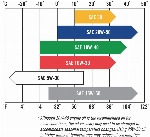Originally Posted By: 4certain
Thanks for all the info. I think after all the replies I'm going with the Mobil 1 Racing 4T 10w40 motor cycle oil. It seems to be a close enough fit to stay within the manufacturers recommmendation and also handle an air cooled engine. I am going to use the mower for my small mowing business so it will be punished with all day use a few times a week. I'm going to also change it every 50 hours because of that.
Good pick. It is defiantly one within manufacturers recommendation. I don't think you would have no problems doing the manufacturers 100 hour OCI recommendation. Since being they make there recommendations starting with conventional oils and you be using one that is better.
Thanks for all the info. I think after all the replies I'm going with the Mobil 1 Racing 4T 10w40 motor cycle oil. It seems to be a close enough fit to stay within the manufacturers recommmendation and also handle an air cooled engine. I am going to use the mower for my small mowing business so it will be punished with all day use a few times a week. I'm going to also change it every 50 hours because of that.
Good pick. It is defiantly one within manufacturers recommendation. I don't think you would have no problems doing the manufacturers 100 hour OCI recommendation. Since being they make there recommendations starting with conventional oils and you be using one that is better.

